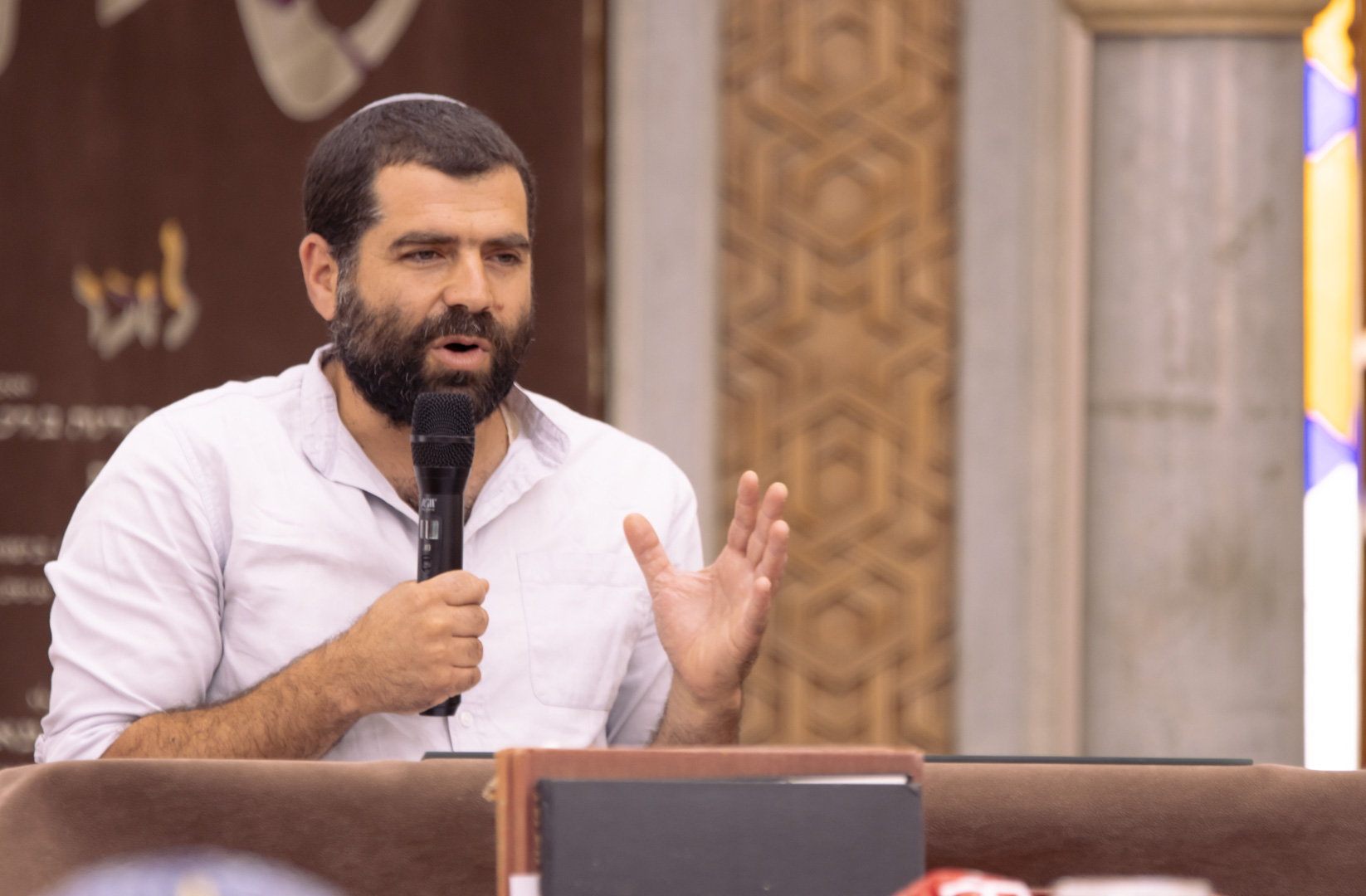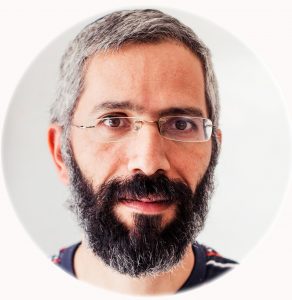נושאים
Translated by Netzach Sapir
Rebbe Akiva famously declared that “Love you neighbor as yourself” (Vayikra 19:18) is a key principle in the Torah (Sifra Kedoshim 2:4). But Rabbi Shimon Ben Pazi less famously posits that the foundation of the Torah can be found in our parsha in the verse about the korban tamid, the daily offering, “the first lamb you shall offer in the morning and the second lamb you shall offer at dusk” (Bamidbar 28:4). We can all relate to Rebbe Akiva’s claim that love is the underpinning value of the Torah, for all of us believe in the importance of love and can relate to it as one of life’s indispensable values, but Rabbi Shimon Ben Pazi’s choice begs explanation.
It would seem that Rabbi Shimon Ben Pazi chose the verse from our parsha not because of the importance of the sacrificial service, but rather to highlight another important value we learn from it – consistency. Everybody talks about love – everyone wants it, searches for it, suffers from its absence – but we are less aware of the importance of consistency. Many people experience constant difficulties because they lack this crucial ability, and they would do well to internalize Rabbi Shimon Ben Pazi’s words.
Entertainment or Personal Growth?
People are increasingly coming to understand – thanks in part to the growing popularity of new-age methodologies – that happiness and meaning are not to be found in improving one’s material conditions, but rather through the development of one’s internal spiritual world. That being said, the reigning impression is that only a minority of people merit to experience the spiritual renewal that they desire. Usually, it is not the methods themselves that are at fault, but one’s inability to commit to their practice in a regular and consistent manner. Deep and meaningful growth is no simple matter. There is no workshop or retreat that can – on its own – effect lasting change in an individual, and anyone who fails to realize this is deceiving herself. A workshop can teach techniques, but only the long-term dedicated practice of those techniques will make a difference.
A friend of mine was deeply influenced by the Vipassana meditative practice. Impressed by the growth I saw in him, I inquired after a workshop in the basic Vipassana meditative practice in which I would dedicate ten days and nights to the breathing-oriented techniques which are the basis of Vipassana meditation. When I asked my friend about his opinion of the workshop, he answered that I was sure to find it an interesting experience, but I would only see any change if I continued to practice it on my own. He summed up the secret of success in any spiritual quest, “to hit water you have to dig deep, and if you keep starting new holes, you’ll never reach it!”
Once there was a man who went to learn Kung Fu in a famous Shao Lin monastery. When he arrived at the monastery, the monks brought him to a pool and told him to spend all day and all night hitting the water. This went on for months. All the while he was sure that soon they would begin to show him the true secrets of Kung Fu. Eventually he got tired of waiting, gave up and went home. When his family asked what he had learned he responded, “Nothing! It was a complete waste of time!” and slammed his hand on the table in frustration. Much to his surprise, the table splintered to pieces.
Rebbe Nachman of Breslov oft would say “all beginnings are difficult.” But as one of my students once pointed out, the opposite is also true – all beginnings are easy. Getting excited about something new doesn’t pose much of a challenge, but consistent practice, after the excitement has worn off and the exercises are tiring and dull, is less appealing.
Setting Times
The consistency embodied by the korban tamid is noteworthy not only because it happened everyday, but even more so because it happened every day at the same time; morning and evening. Without setting a particular time, it is very difficult to do something with consistency, and much energy is wasted in a constant search to “find” the time. All too often, when we need to find time for something on a daily basis, we put it off for tomorrow. Take, for example, a person who is interested in doing a workshop on spiritual growth. The workshop requires a space of twenty-four hours in which the person must adopt a strictly regimented behavior in order to create the proper atmosphere. How frequently would it be reasonable to expect a person to be able to take such a break from the day-to-day obligations of life in order to participate in such a workshop? Twice a year? Or maybe only once a year? As a matter of fact, this workshop already exists, and there are people – working individuals with families and responsibilities – who manage to participate in it on a weekly basis. The workshop is called Shabbat. I suspect that if it were up to us each time anew to find the right time to take a day off for resting and not working, Shabbat would have long ceased to exist, and the same is true of many other mitzvot. The mitzvot create a framework, and become an integral part of daily life, automatically worked into the system. Accepting the framework frees a person so that instead of having to deal with the external aspects of spiritual growth – the what, how and when – she is free to pursue the depths of things. On Shabbat, for example, the Halacha provides the basis and the general structure. The joy of Shabbat – the relaxation, the insight and heightened awareness – all stems from the space created by the halachic framework. This is the spiritual experience of Shabbat.
Some people are put off by a system in which one acts without thinking or deciding for oneself, but therein lies its greatest strength. I had a friend who ran ten kilometers every Friday. One Friday, he told me, a dust storm sprang up and forced him to stop in the middle. The next week he found it difficult to finish his usual 10k because now he knew that there was an option to stop half way. The barrier had been broken. The ability to choose is Man’s unique power, but we must be aware of when it comes to our aid and when it hinders us.
It is told that when a person dies, he is asked in heaven: “Did you set times for studying Torah?” (Shabbat 31a). Why don’t they ask “did you learn Torah?” Why is the emphasis on setting times? It seems that heaven, too, is aware that without consistent times, it is impossible to really learn.
Renewal
And what about renewal and innovation? Does an excess of consistency not risk stunting our ability to reinvent? Heraclitus famously said that you can’t swim in the same river twice. There are two reasons for this: The first is the that the river is not the same river. The water has flowed on, and what now fills the same spot in the riverbed is something new. Whenever we do something with consistency, that which we do will evolve and change. It’s true that the change is slow and gradual, and is less immediately apparent than doing something new altogether, but the change that is built slowly runs deeper. Most of us lack the aspect of depth. Secondly, the swimmer is no longer the same person either, she, too, changes with time. Thus even in consistent and repeated practice we find there is constant newness and change.
A good example of this is the parshat hashavua, the weekly Torah portion. All around the world Jews read the same Torah portion, and this has been going on every week for thousands of years. The Torah is completed every year. The weekly parsha is an anchor of Jewish identity, and it creates continuity between the generations. At the same time, the meaning of the parshas is constantly being understood in a new light, as each generation sees it through the eyes of its own era and situation. Not only that, but the further each individual delves into it, the more she will discover that every year the parsha reveals itself to her in an altogether new way.
Stability
In the Beit HaMikdash the korban tamid created a daily framework – it was the first and last offering of every day. Between these two offerings all of the voluntary and mandatory sacrifices would be offered. On Shabbat and holidays there were additional offerings, which were referred to as “musaf” or “additional,” for they were in addition to the korban tamid.
This principle is also true of life in general. A regular framework gives life its stability. Life has ups and downs. When one has a foundation – stable and consistent – it can provide her with an anchor, enabling her to connect to her roots and not feel, G-d forbid, disconnected and adrift.
Love and Loyalty
Thus far we have discussed the value of consistency as a means toward growth, but it also has a value in and of itself. We mentioned in the beginning the importance of love. Consistency and commitment in a relationship are not only important in order to strengthen the relationship’s bond; the very expression of true love and loyalty to the other is the ability to commit to a relationship not only when it is easy and when things are going well, but also when times are difficult. The same is true in the relationship between Man and his G-d.
I once had a student who enlisted in an elite army unit that had a very demanding training regimen. He confided in me his frustration and disappointment that at the end of each day, when he was exhausted and worn out, he was unable to daven maariv, the evening prayer, with proper intention. I told that him that according to the Talmud (Berachot 26b), prayers are a replacement for the korban tamid. His decision not to surrender to exhaustion and to persevere with his commitment to prayer – even when proper intention eluded him – was exactly the spiritual basis that the korban tamid sought to establish.



























